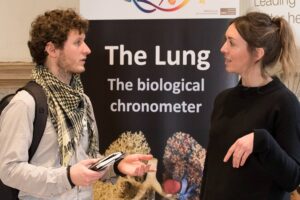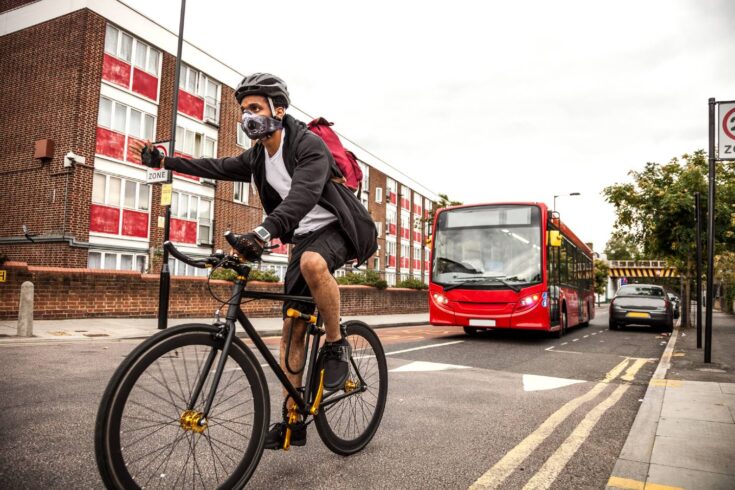At our MRC Centre for Environment and Health, we’re actively engaged in policy roles to address the damage poor air quality inflicts on health, at a national and international level. This includes providing expert input to government and public health agencies to promote the development of science-based policies.
The negative health impact of air pollution
We know that carbon dioxide (CO2) emissions that drive climate change occur as a consequence of the burning of fossil fuels. In addition to generating CO2, the burning of fossil fuels is a major source of air pollutants. Such as:

MRC Centre staff member, Dr Stephanie Wright discusses the role that air pollution has in damaging the lung. Credit: Environmental Research Group, MRC Centre for Environmental and Health, 2020
- fine particulate matter (PM2.5)
- black carbon, nitrogen oxides
- volatile organic compounds
- carbon monoxide
- sulphur dioxide.
All these affect air quality and as a consequence, our health. The two environmental challenges of climate change and air pollution also disproportionately affect the most vulnerable people in society including:
- children and elderly people
- ethnic minorities
- poorer communities
- and people with underlying health conditions.
Climate change exacerbates air pollution
Our exposure to outdoor air pollutants may increase as temperatures increase because of changes in behaviour, such as spending more time outdoors and having windows open for longer.
Studies have also found that increases in future temperature due to climate change will substantially increase the infiltration of air pollutants into homes and, as a consequence, indoor exposure. This is something very relevant to our centre that is increasingly focusing on exposure and health effects of indoor air pollutants.
One example is the WellHome project researching the links between air pollutants and asthma in children. The WellHome project was funded as one of three four-year projects, part of UKRI’s Clean Air programme, with investment supported through UKRI’s Strategic Priorities Fund.
Our centre is also working with the World Health Organisation (WHO) on the health effects of desert dust. The increased frequency of dust storms, with anticipated changes in climate, means that the composition of the particulate pollutant mix we are breathing is changing. Changes that may be worse for our health.
Health co-benefits of mitigation
Research has shown that there are important synergies between air pollution and climate change control policies. Indeed, the correct actions to address the damage that poor air quality inflicts on health will contribute to, and benefit from, efforts for climate neutrality.
As an example, we need changes in power generation to achieve the 80% reduction in emissions set out in the UK’s 2008 Climate Change Act. These are forecast to reduce PM2.5 concentrations by more than 40% by 2050. Estimates suggest that by 2154, this would save up to 1.1 million cumulative life years.
Matching targets with policies
Another parallel between climate change and air pollution is that they both result in encouraging targets being set at the local, national and global level. But targets are not enough. Instead, they must be matched with credible policies to accelerate cleaner technologies and transform societies.
For example, transport policies should not only encourage the uptake of low emission vehicles (PDF, 4.22MB), but also create a shift towards active forms of travel and public transport use. London’s transport strategy (PDF, 4.19MB) now includes both such measures and we are proud to have contributed to this change. These advances need to be accompanied by an increase in infrastructure in urban and rural areas so we are connected with what we need.
Our aim is to facilitate the delivery of integrated strategies that effectively address climate change and air quality. By doing this simultaneously, we can help build cleaner, healthier, and more resilient societies that will benefit future generations.
Find out more about how UKRI is responding to climate change
UK Research and Innovation (UKRI) is supporting activities and events that inspire and engage people and promote positive climate action for the UN climate change summit (COP26) in Glasgow.
Visit the virtual UKRI COP26 event site.
Read articles highlighting relevant research by the MRC Centre for Environment and Health:
- Global nature of airborne particle toxicity and health effects: a focus on megacities, wildfires, dust storms and residential biomass burning
- Improving indoor air quality, health and performance within environments where people live, travel, learn and work
- Twin problems of climate change and air pollution
Top image: Credit: LeoPatrizi/Getty Images




